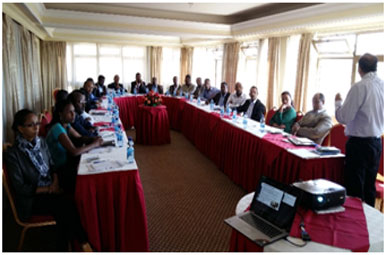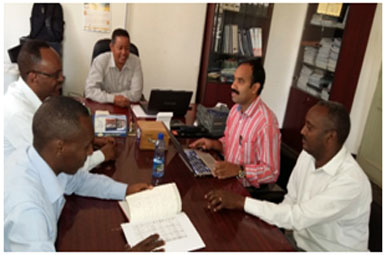Association of Ethiopian Microfinance Institutes (AEMFI) is MFI network organization with 35 MFIs as members of the network. AEMFI realized that MIS is a key component for the MFIs to develop their capacity and outreach in a sustainable manner. Accordingly, concerted efforts are being made by the MFIs and other stakeholders to acquire suitable MIS solutions and other technology assisted financial solutions for enhanced and efficient delivery of financial services. The project was supported by Rural Financial Intermediation Programme-II (RUFIP), International Fund for Agricultural Development (IFAD) and National Bank of Ethiopia (NBE). BASIXwas assigned to conduct systematic study of MFIs technology needs and produce technologyroadmap. The roadmap expected to develop dynamic and vibrant MFI eco-system in Ethiopia and create a platform for adopting best practices and promote decisions based on data in MFI sector.
To develop a Roadmap for Management Information System for MFI Sector in Ethiopiato provide a direction to execute a best-in-class, relevant and cost effective Core Banking Solution (CBS) and mobility solutions for small and medium sized MFI’s in Ethiopia.
individual interactions were undertaken with more than 25 medium and small MFIs, technology companies providing mobile financial services, Ethio Telecom, Ethio Switch and various other stakeholders. These discussions brought excellent insights of needs of MFIs and pain points. The findingswere presented to AEMFI and its members through a Workshop organized by AEMFI at Addis Ababa. The Workshop brought a common understanding between MFIs, Regulators and Stakeholders on way forward to implement technology solutions to enable microfinance business.

It was found that 82% of MFIs still use Excel or Manual systems for loan portfolio management and 18% MFI’s has semi-automated systems. 45% of MFIs use Excel or Manual system for Financial Accounting and 45% use Peachtree Accounting software and none of the MFI’s use any software applications.
Recommendation was made for all the MFI’s to use an application that is hosted in a Shared Data Center (SDC). This would allow MFI’s to have a pay-per-use subscription model allowing them to operate with minimal cost and also allows them to operate from remote locations with minimal investment in infrastructure. The CBS for all of the MFIs would be hosted in the same Data Center. This would allow for optimum usage of the DC infrastructure & resources in terms of Application Servers, Database Servers, VPN, Security policies etc. Also hosting in the same facility would ensure better fault tolerance and redundancy in the setup.
The shared platform has number of advantages which can be leveraged to reduce the Total Cost of Ownership (TCO) of the MFIs in their pursuit of operational effectiveness.

Another important technology integration proposedwas mobile financial services. The objective of mobile technology is to deliver financial services outside conventional MFI branches, often using non-bank retail agents and relying on technologies such as mobiles or card reading point-of-sales (POS) terminals for real time transaction processing. MFI agent is often a retail or postal outlet contracted by microfinance institution to provide a range of financial services to customers. They can then set up a mobile branch for the day and offer a range of financial services. Under this model the agent can visit several locations regularly on a rotation basis. Considering low percentage of people with a formal bank account in Ethiopia, agent banking is an important tool which can be used to facilitate financial inclusion and help bank the unbanked.
Therecommendation for technology roadmap brought out a new era of MFI business through technology as akey enabler. The MFI leaders, Regulators and MFI association accepted the findings and suggestions as a way forward to improve efficiency of MFIs. Millions of rural customers expected to get benefited from the implementation of the proposed roadmap. The suggested technology implementation is under progress.